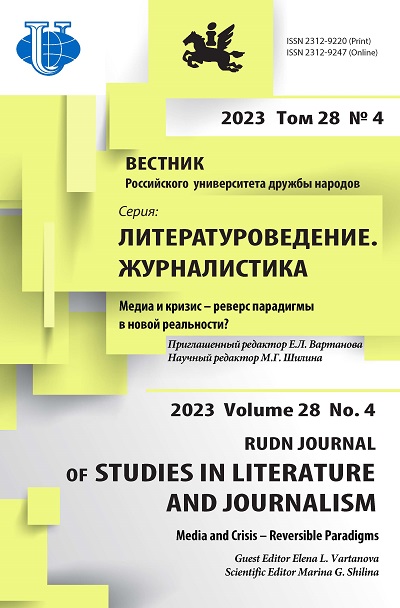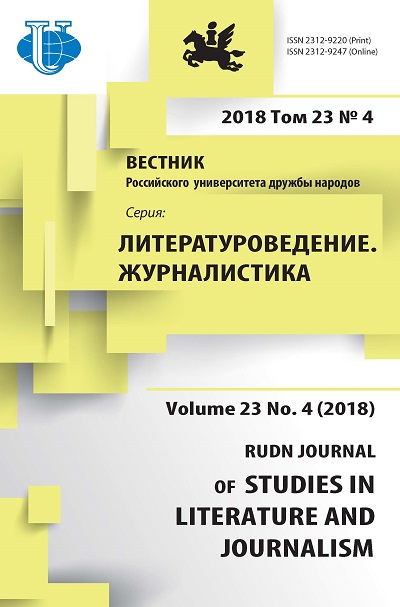Reflections about revolution in A. Varlamov and E. Vodolazkin’s creativity (“Mental wolf” and “Aviator”)
- Authors: Krotova D.V.1
-
Affiliations:
- Lomonosov Moscow State University
- Issue: Vol 23, No 4 (2018)
- Pages: 393-401
- Section: LITERARY CRITICISM
- URL: https://journals.rudn.ru/literary-criticism/article/view/20447
- DOI: https://doi.org/10.22363/2312-9220-2018-23-4-393-401
Cite item
Full Text
Abstract
The article is devoted to the comparative analysis of the ideas of revolution expressed in novels “Mental Wolf” by A. Varlamov (2014) and “Aviator” by E. Vodolazkin (2017). Essentially various is an approach of two writers to interpretation of revolution: Varlamov expresses his own understanding in “Mental Wolf”, Vodolazkin in “Aviator” aims to express only possible vision of revolution by one of contemporaries of those far events. At the same time, both the similarity and cardinal divergences in interpretation of a subject of revolution in the called novels are detected. The community is that both authors’ perception of revolution is tragic: it is interpreted as a change which has caused deeply destructive consequences. In assessment of the essence of revolution for the hero of “Aviator” defining there is a moral vector while in “Mental Wolf”, on the contrary, idea of revolution is closely linked to the non-moral, spontaneous aspect. In the analysis of the novel “Mental Wolf” both parallels and basic divergences with the concepts of revolution created in literature of the first decades of the 20th century are revealed (A. Blok, B. Pilnyak, etc.). In article it is proved, that both A.Varlamov and E. Vodolazkin, reflecting on events of 1917, set as the purpose the judgment of certain key regularities of national history (“Mental Wolf”) and also the principles of relationship between the personality and history in general (“Aviator”). Analyzing a problem and thematic complex and art specifics of the called novels, the author of article proves a statement about a neomodernist vector of thinking of both writers.
About the authors
Darya Viktorovna Krotova
Lomonosov Moscow State University
Author for correspondence.
Email: da-kro@yandex.ru
PhD, Moscow Lomonosov State University, Department of the History of Modern Russian Literature and Contemporary Literary Process
1 Leninskie Gory, Moscow, 119991, Russian FederationReferences
- Kovalenko A.G. Ocherki hudozhestvennoj konfliktologii: antinomizm i binarnyj arhetip v russkoj literature XX veka [Sketches of art conflictology: antinomy and binary archetype in Russian literature of the 20th century]. Moscow: RUDN, 2010. 491 p.
- Interv’ju s “russkim Umberto Eco” Evgeniem Vodolazkinym [Interview with “Russian Umberto Eco” Evgeniy Vodolazkin]. Available at: http://100000-knig.ru/news/intervyu-s-russkimumberto-eko-evgeniem-vodolazkinym/ (accessed: 01.10.2018).
- Vodolazkin E. «Aviator» — ochen’ peterburgskiy roman [“Aviator” — very Saint Petersburg novel]. Available at: http://turpiter.ru/evgenii-vodolazkin-aviator-ochen-peterburgskii-roman/ (accessed: 01.10.2018).
- Vodolazkin E. Aviator. Moscow: AST, 2017. 410 p.
- Blok A. Intelligentsiya i revolutsiya [Intelligentsia and Revolution]. In: Blok A. O naznachenii poeta [About the mission of a poet]. Moscow: Sov. Rossiya, 1971. Pp. 6—23.
- Pisatel’ Evgeniy Vodolazkin ob urokah 1917 goda i o pereezde utopii iz Rossii na Zapad [The writer Evgeniy Vodolazkin about the lessons of 1917 and about the move of utopia from Russia to West]. Available at: https://www.dp.ru/a/2017/01/19/Oni_nachinajut_rastit_v_se (accessed: 01.10.2018).
- Varlamov A. Myslennyi volk [Mental wolf]. Moscow: AST, 2015. 508 p.
- Soldatkina Ya.V. Tvorcheskoe nasledie A.P. Platonova i semantiko-esteticheskie poiski v sovremennoy russkoy proze (A.N. Varlamov “Myslennyi volk”, A.V. Ivanov “Nenast’je”) [The artistic heritage of A.P. Platonov and semantic and aesthetic searches in contemporary Russian prose (A.N. Varlamov “Mental Wolf”, A.V. Ivanov “Foul weather”)]. Vestnik RUDN. Seriya: Literaturovedenie. Zhurnalistika. 2016. No. 1. Pp. 45—54.
- Meskin V.A. “Myslennyi volk” Alekseya Varlamova kak opyt simvolistskogo romana [Aleksey Varlamov’s “Mental Wolf” as an experience of symbolist novel]. RUDN Journal of Studies in Literature and Journalism. 2017. No. 1. Pp. 55—65.
- Krotova D.V. Sovremennaya russkaya literature. Postmodernizm i neomodernizm [Modern Russian literature. Postmodernism and neomodernism]. Moscow: MAKS Press, 2018. 224 p.
















